Transforming communities in Uganda
Soroti, Uganda, 20-22 January, 2012
Soroti is the main municipal, commercial and administrative centre of Soroti District in Eastern Uganda. The town still has many buildings that reflect the tastes of the large Indian population that once traded in the town. These ornate buildings fell into disrepair following Idi Amin’s expulsion of Asian people in the 1970s.
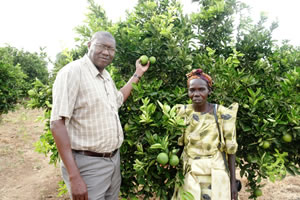
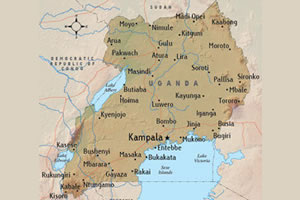
The Pentecostal Assemblies of God (PAG) operate 5,000 churches in Uganda and PAG’s approach to holistic ministry aims to address the spiritual and physical needs of communities using a participatory evaluation process (PEP). PEP is also known as church and community mobilization (CCMP) and the aim is to build confidence and self-reliance. (Above, right) PAG General Superintendent Revd. Dr Simon Peter Emiau inspects the lemons grown as a source of income in Atutur Community, Kumi, Eastern Uganda.
Soroti, Preparations – Fri 20 and Sat 21 Jan
Introduced in 2003, the participatory evaluation process (PEP) is used by the Pentecostal Assemblies of God (PAG) to equip the local church and thereafter its community for self- directed sustainable development. The process has been so successful that PAG’s aim is to integrate PEP with its ministry in all 5,000 PAG churches in Uganda. Now, for the first time, GULL provides a way of recognizing the participants and their achievements. A big celebration was planned!
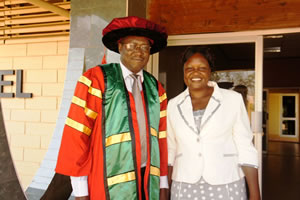
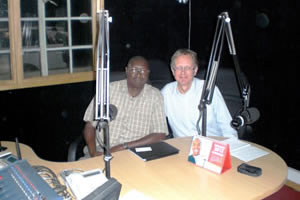
(Above left) Simon Peter Emiau and Richard Teare visit Talk Radio, Soroti to talk about PEP and GULL. Many listeners called in with questions.
(Above right, left) Revd. Dr Simon Peter Emiau, General Superintendent, Pentecostal Assemblies of God Uganda prepares to receive GULL’s Doctor of Professional Studies award in recognition of his support for PEP and GULL. (Right) Jane Achaloi, PAG’s national co-ordinator for PEP in Uganda.
A mighty celebration! Soroti town centre, Sat 21 Jan
On Saturday morning 21 January, probably the largest procession ever seen in Soroti assembled in the town centre. More than 1,200 PEP-GULL graduands - led by a brass band - marched for 2 miles to the grounds of the Soroti hotel for their GULL recognition ceremony. The procession brought the town to a halt as hundreds of curious people lined the route!
At the front of the procession, two graduands carried an explanatory banner: ‘Transforming Communities Through Participatory Approach – GULL Graduation Through PAG (U)’. This was a day to celebrate change, facilitated by participants representing communities in the Soroti region and beyond.
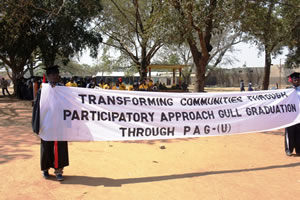
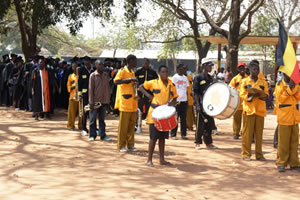
(Above left) The procession forms in the town centre behind a brass band from the local Anglican church
(Above right) The PEP – PAG (U) – GULL banner!
Recognition ceremony, Soroti hotel, Sat 21 Jan
The Pentecostal Assemblies of God (PAG) with support from Tearfund, use the participatory evaluation process (PEP) to equip the local church and its community to achieve greater self- reliance. To recognize the outcomes, GULL’s professional Bachelor pathway is inter-linked with PEP, providing certification at three levels. Some 1,200 participants received GULL’s level 2 Certificate (‘Church Awakening’ stage) or level 3 Diploma (‘Church & Community Mobilization’ stage) and 20 participants received GULL’s Bachelor of Professional Studies (Church & Community Mobilization). The professional degree is awarded to those who have fully implemented PEP and also trained co-facilitators. Jane Achaloi, the PEP national co- ordinator received GULL’s Master of Professional Studies for her key contribution to the development of a return on investment tracking system for CCMP/PEP in East Africa.
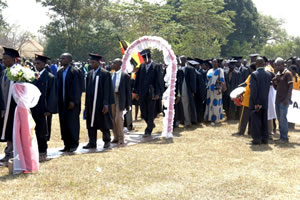
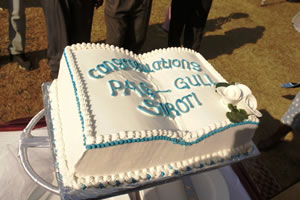
(Above left) Congratulations! The PAG-GULL graduation day cake.
(Above right) Graduands arrive - led by the PAG General Superintendent and Jane Achaloi, PEP National Co- ordinator for Uganda.
Omagoro Community, Soroti, Sun 22 Jan
Community mobilization is a participatory process for change that can greatly benefit poor communities. Among other factors, communities are held back by lack of formal organization, the mis-perception that politicians and others will alleviate their problems for them and a shortage of available resources to facilitate collaborative action.
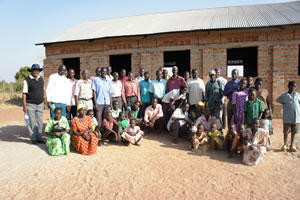 The objective of the participatory evaluation process (PEP) is to bring about change in local churches and communities. PEP uses an action learning approach to assist participants to begin by reviewing and adjusting their own mindset – often the biggest barrier to change. PEP facilitator training is phased over a 2-3 year period so that participants are able to apply the process and gradually cascade their own learning to co-facilitators and others in the local church and community.
The objective of the participatory evaluation process (PEP) is to bring about change in local churches and communities. PEP uses an action learning approach to assist participants to begin by reviewing and adjusting their own mindset – often the biggest barrier to change. PEP facilitator training is phased over a 2-3 year period so that participants are able to apply the process and gradually cascade their own learning to co-facilitators and others in the local church and community.
(Right) Members of Omagoro Community in the Soroti region pictured outside the church they built themselves, have been using the PEP process to make advances in their community for a number of years.
The Church has played a pivotal role in enabling Omagoro community to maximize the use of its available resources and this has transformed the community’s standard of living. For example, the participatory evaluation process has enabled the community to secure its own water supply (via the construction of five wells with pumps that provide clean and reliable water for all); initiate an array of food security projects (the community has its own supply of freshwater fish from its own fish pools and numerous fruit, vegetable and livestock farms) and construct permanent brick buildings (the community makes its own bricks and constructs its own buildings).
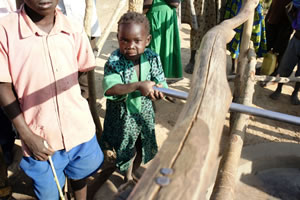
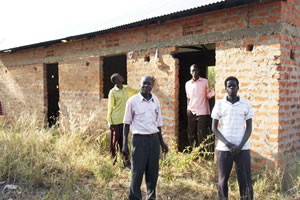
(Above left) This school building is constructed entirely from bricks made from the materials found in termite mounds! Homeless termites simply make another mound!
(Above right) A young girl demonstrates how to operate the pump mechanism at one of Omagoro’s five wells. Due to their own efforts, the community now has a permanent, safe water supply.
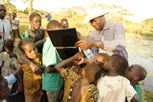
(Left) Revd. Dr Simon Peter Emiau standing next to a community fish pool, displays the photos he has taken of the crowd of boys around him.
GULL is a non-profit public benefit corporation registered in California, USA. GULL’s mandate to confer professional awards is based on a statement of recognition offered in perpetuity and signed by the Head of State and the Prime Minister of Papua New Guinea on 10 April 2007. GULL is also endorsed by other Governments, Leaders and Institutions.
20-22 January, 2012
Participatory Evaluation Process (PEP) & GULL Outcomes review and recognition ceremony hosted by the Pentecostal Assemblies of God (PAG) Uganda at the Soroti Hotel, Soroti, Uganda, Saturday 21 January.